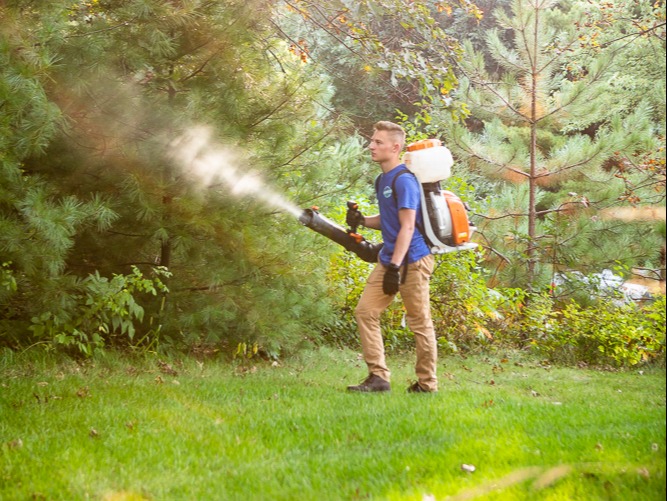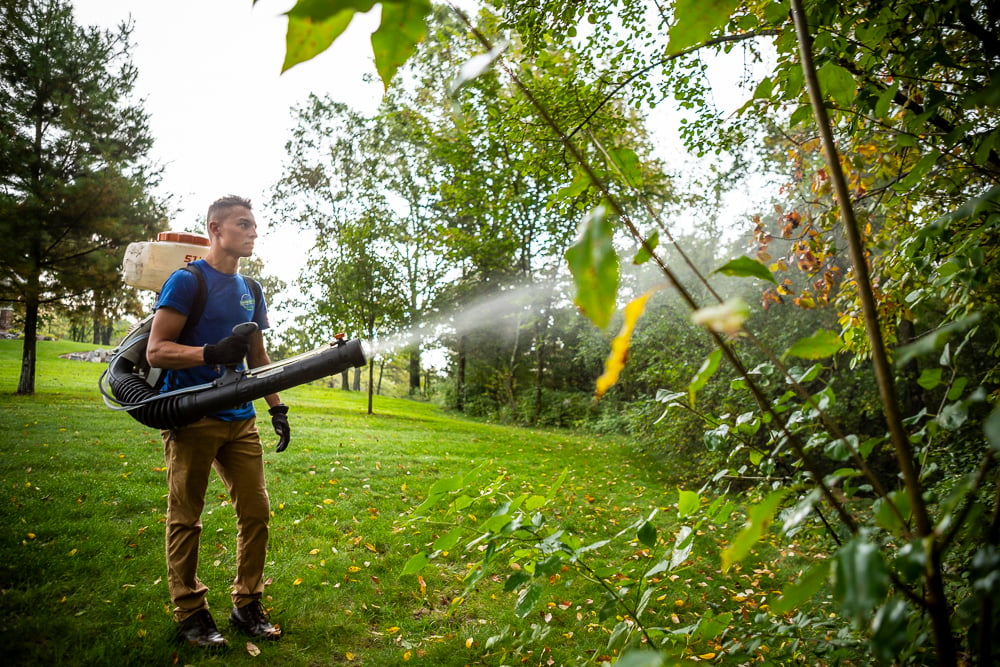Description
Common active ingredients in mosquito fogging chemicals include pyrethrin, permethrin, and other synthetic pyrethroids. These ingredients are highly effective at killing mosquitoes on contact and often provide residual protection, reducing the need for frequent reapplication.
There are lots of different ways to go after dastardly mosquitoes, and if you’re reading this wrapped up in three blankets with only your eyes showing, you haven’t yet discovered the best way.
Attacking the pesky biters in your yard, where they live and breed, is your best bet. But how?
Fill your yard with a fog of insecticide? Attack with mosquito-killing mist? Cover mosquito hot spots with targeted mosquito barrier spray?
Mosquito barrier spray vs fogging? Mosquito barrier spray vs misting?
What’s the difference?
How to best banish the annoying, disease-carrying intruders so you can enjoy your yard again?
Pause your swatting and let’s take a look.
A Look at Mosquito Misting
Mosquito misting systems release a fine mist of insecticide into the air, targeting mosquitoes as they fly by.
View Pest Control Programs & Pricing
Spray nozzles are mounted in several spots around the perimeter of your home. The nozzles are connected by tubing to a supply of insecticide.
The misting system is programmed to release the insecticide at specific intervals, usually when mosquitoes are most active, at dusk and dawn.
The mist sprays out, lingers in the air, and when mosquitoes come in contact with it, they’re dead.
Some misting systems can be turned on automatically at certain intervals using a timer. Others include a remote control, while others are activated using a switch.
What’s Mosquito Fogging?
Mosquito fogging technicians use a backpack fogging machine to release a heated fog of insecticide into your yard.
It’s designed as a short-term method. Most fogging treatments last 72 hours, mostly for keeping mosquitoes at bay during backyard parties or events.
How Does Mosquito Barrier Spray Work?
Mosquito barrier spray works by killing mosquitoes that land and rest on treated plants or hard surfaces.


Mosquitoes land and rest a lot. They’re weak fliers, which means they’re taking lots of rest stops on all the areas coated with mosquito barrier spray. Then, it kills them on contact.
Mosquito barrier spray is applied by licensed technicians using backpack spray systems that convert the liquid insecticide into large droplets.
Mosquito barrier spray is applied to the perimeter of your yard, hitting the spots where mosquitoes lurk and breed:
- Underneath plant leaves
- Shady areas
- Wet areas
- Under decks
- Under tree canopies
- Wood piles
Then, bam, immediate results. No swatting required.
RainMaster’s mosquito barrier spray program reduces mosquitoes on your property all season long, with regular visits every three weeks. It’s designed not just to kill mosquitoes, but to kill developing larvae, too.
Barrier Spray vs Misting: Key Differences
A few things to note:
Mosquito mist can be carried by the wind, drifting to areas outside your yard. Mosquito barrier spray stays put once it dries on plant leaves and other surfaces.


Misting system sprays are usually effective for a couple of hours after each spray. Mosquito barrier spray lasts for three weeks, and is reapplied every three weeks throughout mosquito season.
Misting systems are automatic — they don’t know if there are people or pets outside near the mist. Certified and licensed mosquito barrier spray technicians make sure no people or pets are in the area during treatment and 30 minutes afterward to allow the products to dry. Once dry, your yard can be used as normal.
Automatic misting on a timed schedule occurs even if it’s windy or rainy, which often wastes the products. Mosquito barrier spray treatments are controlled by the technicians, who will reschedule your treatment if it’s too windy or rainy that day.
Misting systems release insecticide into the air, killing adult mosquitoes that happen to fly into the mist. Mosquito barrier spray is applied to targeted areas in your yard, including wet or damp areas where mosquitoes lay eggs, killing the larvae too.
Barrier Spray vs Fogging: How Are They Different?
Fogging will kill adult mosquitoes that fly through the fog. Mosquito barrier spray lingers on surfaces, killing mosquitoes for three weeks, with repeated visits throughout the season.


Fogging is a short-term fix, designed to work for about 72 hours. Mosquito barrier spray kills mosquitoes all season long.
Fogging doesn’t kill mosquito larvae or eggs. Mosquito barrier spray is applied to areas where mosquitoes lay eggs, eliminating hundreds of future mosquitoes.
Fogging doesn’t typically target mosquitoes hiding out underneath leaves or nestled under your deck. Mosquito barrier spray is strategically applied to these areas, and other nooks and crannies on your property where mosquitoes linger.
Need Mosquito Barrier Spray? Trust RainMaster
Your backyard shouldn’t be dangerous. But when disease-carrying mosquitoes crash the barbecue, it is.
Isn’t it time you took your yard back?
No more retreating inside from the pesky invaders who took over.
It’s your yard. Get back in the garden, out to the grill, and on the swing set again.
Reclaim your worry-free backyard with targeted mosquito control in Eau Claire, WI and Minneapolis that reduces mosquitoes in your yard all season long.
Are you ready to stop stressing about mosquitoes and ticks? Get a free quote for mosquito control. Then, you can get back to enjoying your yard, without all the swatting and scratching.




sujon –
Best for cleaning